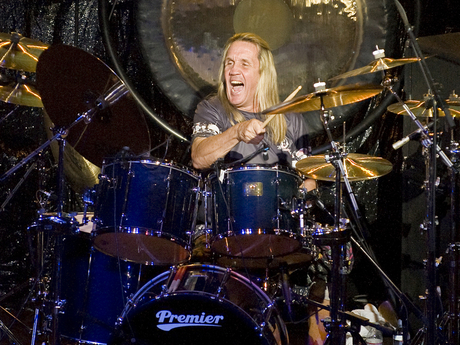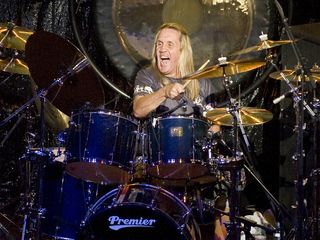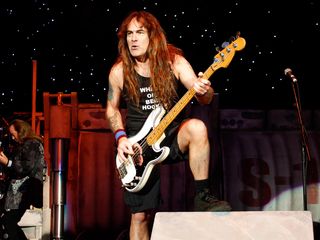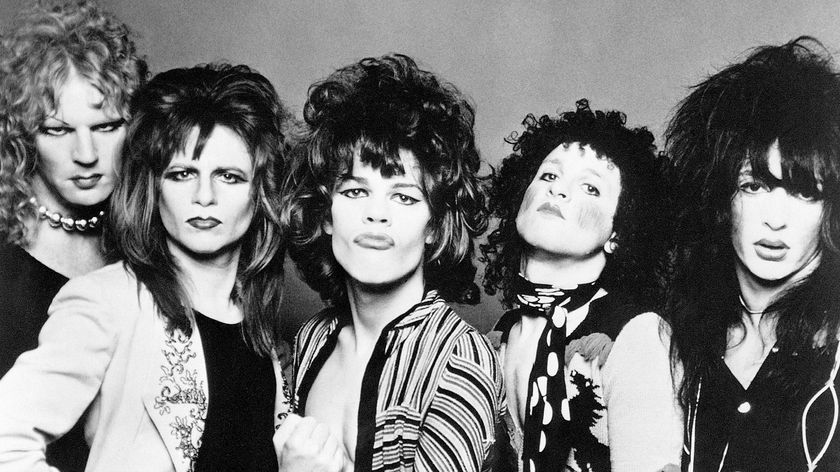

Nicko McBrain rocks out at the Guitar Center Drum-Off in Los Angeles, California, 2009. © Markus Cuff/Corbis
With the release of The Final Frontier, Iron Maiden's 15th studio album, the veteran heavy metal band have reinvented themselves. Refusing to become an oldies act, doling out thinly disguised versions of Run To The Hills or The Trooper, they've achieved something extraordinarily rare for a group of their vintage, reaching new levels of creativity, hunger and vision.
Oh yeah, they've also done something else that's more than a little remarkable: they've gotten cool.
"Yeah, we're cool. I'll take that!" says drummer Nicko McBrain with a loud laugh. The affable, 56-year-old is enjoying a night off at a Chinese restaurant in London, but he's happy to hold forth, theorizing that, like Rush, another 'people's band,' the critical tide has turned in Maiden's favor because "the people who are writers now were our fans back in the day. They always liked what we did and now they're in a position to write about it. That's what happens when you hang around long enough, I guess."
McBrain has another hypothesis, however, one he terms 'The 10-Year Cycle of Iron Maiden.' According to the drummer, every decade or so the band hits a new wave of popularity. "You see it in how the fans react, how our shows sell out, the whole climate that surrounds us. We're just at the crest of that new cycle right now. Hopefully, we can make it last longer than the others."
Although one can probably safely take that last statement to the bank, for McBrain, who recently placed in the upper region of the Rhythm Magazine/MusicRadar Greatest Drummer Of The Last 25 Years poll, it's artistry that matters most, and he's not above calling The Final Frontier "a real breakthrough for us. It's filled with epic songs, but it doesn't just go on and on for the sake of it. There's ideas and real heart on it. We felt everything we were playing. That's what makes a band a real band and a record a real record - the amount of feeling you put into what you do. I'm real proud to say we've still got that attitude; in fact, we have it more than ever."
In the following interview with MusicRadar, McBrain discusses what it would mean for Iron Maiden to hit number one with The Final Frontier. The celebrated drummer, who now lives in South Florida, also talks about how the new album came about, his technique (double bass setups are still a big no-no!), early influences and what new drummers on the scene he admires.
Get the MusicRadar Newsletter
Want all the hottest music and gear news, reviews, deals, features and more, direct to your inbox? Sign up here.
You've had number one albums in the past in the UK and other countries, but it looks as though The Final Frontier could debut at the top spot in the US. What would that mean for the band?
"It would mean that our American fans listened! [laughs] You know, [singer] Bruce [Dickinson] made it quite clear to all of our fans in America and Canada when we were on tour there during the summer that it would be great to go to number one, so hopefully everybody paid attention.
"Going number one would be amazing, a great accolade, of course. Would it mean the same now as it might have 15 or 20 years ago? I can't say. But at the end of the day, I know we have a great album. I think it's a work of art. If it's not the number one album the first week, then hopefully it will be the second or third week - once people give it a listen, you know? Obviously, it would be nice now that I'm…well, I'm not really a citizen. What am I, a 'legal alien' or something?" [laughs]
Sounds about right.
"People have called me that before I moved to America, so I'm used to it. Don't get me wrong - it would be great to go number one in the US, and I hope it happens. Really, that would be amazing. If it doesn't, though, hey, it's not the end of the world."

McBrain considers bassist Steve Harris' When The Wild Wind Blows one of the best songs he's ever written. © Scott D. Smith/Retna ./Retna Ltd./Corbis
Musically, what were your goals on this record? There's so many unexpected moments, and many of them are prog rock in nature.
"I would say my first and foremost goal was to finish the record without keeling over dead! [laughs] In all seriousness, though, we rehearsed seven tracks in Paris before we went to record them. Three of the other ones we had the sketches for, but we had to work them up once we got in the studio. For me, the big expectation was working on the three songs that we didn't rehearse; I wanted to get their vibe as quickly as I could and really nail them without taking a whole lot of time.
"In terms of figuring out the progressions on the album, it was very much like it was in the old days. It was us together in one room going, 'Okay, how are we going to get from this bit to that bit?' You know what I mean? It was natural, a band working as one. We were all looking at one another and communicating and feeling at home, if you like."
As I mentioned, there are definite progressive rock elements on the record. Do you listen to prog rock, whether it's new or old?
"Oh, without a doubt. I grew up with bands like Love Unlimited, Hawkwind, Golden Earring, Jethro Tull, Deep Purple - although Purple aren't really progressive; they were in their earlier days. And then, of course, there was Pink Floyd, one of my all-time favorite bands from that period - very progressive.
"With The Final Frontier, it wasn't as if we regressed. We took a lot of our history and revisited it in certain ways. Take our album A Matter Of Life And Death, for example: that's a very adventurous record that uses elements from late '60s and early '70s underground progressive rock. So now we kind of stepped back into that territory and carried if further, way beyond anything we've ever done before. The segues, the song structures, the time signatures - we placed no restrictions on ourselves."
What did you think when you got some of the demos, particularly the one for the song When The Wild Wind Blows? It's quite an epic.
"It sure is. That was one of the songs we did in the studio. When Steve [Harris] brought the song in, he showed it to us, gave the guitarists the chord progressions and everything. I could tell right off it was something special. Because of the kind of song it is, though, I looked at Harry [editor's note: the nickname for Steve Harris] and said, 'What do you want from the drums, busy or straight?' And he said, 'Let's have it straight. We need some real groove on this track.'
"That's all he needed to say. I told him, 'Let me have what you're playing on the bass,' and we worked that part out. Then we went for the second part, then we had the segue breakdown and it went from there. When we finished recording the song, I turned to Steven and said, 'Next to Hallowed Be Thy Name, I think this is the best song you've ever written.' And he went, 'Nahhh!' And I said, 'To me it is.' That's how I feel - I think it's just immense.
"The funny thing is, there wasn't a lot of preparation for that song or any of the other ones, really. It was just learn it, feel it and play it. That's what we did on this record. It was true to its form, without a lot of contrived pieces. And there's even a couple of mistakes on it, to boot, which I think is great."
Have you made any changes to your kit recently? How are you angling your cymbals, particularly your ride?
"No changes at all, mate. I did change my kit several years ago. I lowered the cymbals a bit and angled them more. But I haven't done anything since then. There's really not that much you can do with my drum set without changing the whole thing. If I move the cymbals down, then I have to take the tom-toms down. And if I take my hi-hat down, forget about it - that completely changes the physiology of the set."
You're known for your disdain of double bass drums and double bass pedals. You're equally known for your love of playing barefoot.
[laughs] "Yeah, I used to play with Lonsdale boxing boots, 'cause they have very thin soles and you can get a lot of bounce from them. If I was wearing a pair of army boots, I don't think I'd get the same results.
"Occasionally, I'll jam with people and I'll be wearin' shoes. Really, a lot of my bass technique has to do with the way my pedal is set up and how strong the spring is. A lot of players should pay more attention to this. For me, the angle of the beater in a neutral position - that is, without your foot on it at all - should be 45 degrees. Picture the beater on the floor and it's centered towards the bass drum head - 45 degrees is it.
"As far as double bass-sounding patterns, I do have one little trick: Once I've got the bass drum really kickin', I'll move my foot down the pedal about two-thirds of the way. To me, that's the optimal fulcrum point and I can get maximum results with less exertion. There is a problem with that, however, when you're trying to do a dynamic on a beat, particularly on a 16th-note group - you've got to really kick it. It's harder to do an accent when your foot's all the way down the pedal. Through the years, I've found the only thing that really works is matching what Harry Harris plays. What I play on the bass drum is pretty much determined by the bass lines."
Do you have any kind of practice routine or pre-show warm-ups that you adhere to?
"No real routine, no. Before a show, I'll have a good 10-minute warm-up on a little practice kit backstage. That's pretty much to get my hands loose and acclimated to the climate, which is especially important if it's an outdoor gig and it's a bit cold on stage. I have a touch of arthritis in my hands, and if it's really chilly outside I can have a problem holding onto my sticks, so getting the hands nice and warm before the gig is a must. Plus, it's good to get the feet and the whole body moving.
"Sometimes I'll do longer, 15 or 20 minutes. You don't want to overdo it; you want to go out there feeling fresh and with the adrenaline pumping, but at the same time, you want to practice your rudiments, do some triplets and quadruplets and stuff. After that, it's time to rock."
One of your first influences was the jazz drummer Joe Morello. I'm curious - did you start out with a traditional grip, as so many jazz drummers do?
"No, mate. Joe Morello was basically responsible for me wanting to be a drummer, but I didn't really study his actual technique. What happened was, The Beatles came out and Ringo Starr became my, uh, 'star.' [laughs] And then, of course, there was The Rolling Stones with Charlie Watts. From there it progressed to Keith Moon and John Bonham - I loved all of those guys.
"Then, as I got more into drumming, I heard Buddy Rich and Louie Bellson, who were great. My father introduced me to [ex-Tonight Show drummer] Ed Shaughnessy and people like that. So I had some jazz influences. It was kind of weird, because I started out with pop and then got into rock, blues and jazz."
Did you ever play with any jazz bands?
"Not really. I've picked stuff up through jazz, but never really studied it. I dabbled in a couple of avant-garde bands, but really, my main influences came from blues-based drummers."
Is there anything in particular about your playing you'd like to improve?
"Yeah, everything! [laughs] No, seriously, like all the drummers I know, all the great players, we learn from one another and explore various avenues - things like timing and bits and bobs. But I love doing what I do, and through the good Lord's grace I still have the health to do it. I'll continue to play this kind of music as long as I can keep it going.
"On the other hand, I have a soft spot for bands like Blood, Sweat & Tears and Chicago. Funk music, too - I absolutely love funk. Big soul music, like all the great stuff from Muscle Shoals, I love all of that. There's so much to absorb, you know? As far as my own style goes, I think I'll always be a power hitter. I do like to play with dynamics, but I tend to pretty much get my head down and go at it. With the other types of music I mentioned, your approach has to be more refined."
Have there been any new drummers recently who have impressed you?
"Yeah, Thomas Lang. He's taken the ostinatto stuff that Terry Bozzio really helped develop to a whole new place. When it comes to having four independent rhythms happening simultaneously, I've never seen a guy with as much dexterity as Thomas. He's got great chops, fantastic finesse - I really love to hear his playing. The only problem is, when I watch him perform, I just go, 'Why?…' [laughs] He's that great!
"Jojo Mayer is another player I thoroughly respect and admire. He's taken these new electro-disco beats that most people do on machines, but he can actually play them. Totally frightening technique.
"Jason Bittner [from the band Shadows Fall] is one of the newer rock players I really like. He's got some really nice chops and very good double bass drum technique. So those guys are the ones who really stand out and who have impressed me. I'm not influenced by them per se, but I do admire what they do."
On the first leg of the American tour, Iron Maiden played only one new song, El Dorado, live. Have you added other new songs to the set? Plus, how much of the new album do you think you'll eventually fit in?
"We haven't added any new songs to the stable other than El Dorado, which is number four in the setlist. Ultimately, I think we'll add four or five new ones. It'd be nice to get six if we can, but the album has 11 songs and it's a long record, so it's hard to tell right now."
By the way, I love your playing on the song Isle Of Avalon. You're really battering the hell out of the floor toms at the end.
[laughs] "Yeah! That was a lot of fun to play. Head down and go for it, you know? But thank you so much. I'm really glad you liked it. Hopefully, everybody else will feel the same way. We'll know soon enough."
Liked this? Then read Iron Maiden: The Final Frontier review track-by-track
Connect with MusicRadar: via Twitter, Facebook and YouTube
Get MusicRadar straight to your inbox: Sign up for the free weekly newsletter
Joe is a freelance journalist who has, over the past few decades, interviewed hundreds of guitarists for Guitar World, Guitar Player, MusicRadar and Classic Rock. He is also a former editor of Guitar World, contributing writer for Guitar Aficionado and VP of A&R for Island Records. He’s an enthusiastic guitarist, but he’s nowhere near the likes of the people he interviews. Surprisingly, his skills are more suited to the drums. If you need a drummer for your Beatles tribute band, look him up.

"Reggae is more freeform than the blues. But more important, reggae is for everyone": Bob Marley and the Wailers' Catch a Fire, track-by-track

“Part of a beautiful American tradition”: A music theory expert explains the country roots of Beyoncé’s Texas Hold ‘Em, and why it also owes a debt to the blues
Most Popular








